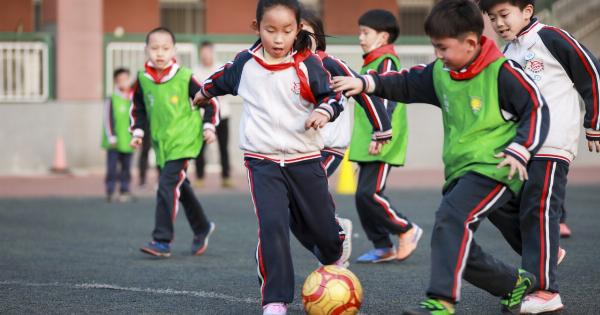Football, also known as soccer, is one of the most popular sports in the world. It is a team sport that requires players to have a combination of physical fitness, technical skills, and mental abilities.
While it is widely known that football has various physical benefits for children, such as improving cardiovascular health and enhancing motor skills, its impact on cognitive development is often overlooked. Research suggests that playing football can significantly improve focus and attention in children, leading to enhanced academic performance and mental well-being.
The Role of Focus and Attention in Children
Focus and attention are essential cognitive skills that play a fundamental role in a child’s overall development. They are crucial for learning, problem-solving, decision-making, and successfully completing tasks.
Children with strong focus and attention abilities are more likely to excel academically, have better social interactions, and exhibit improved self-control and impulse regulation. On the other hand, children who struggle with focus and attention may experience difficulties in various areas of life and may be at risk for learning and behavioral problems.
Football and Cognitive Development
Football is a complex sport that requires players to constantly process information, make split-second decisions, and anticipate and react to the movements of teammates and opponents.
These cognitive demands place a significant demand on attentional resources, training the brain to focus and concentrate effectively. The following sections highlight how football improves focus and attention in children:.
1. Increased Mental Alertness
During a football game, players must be mentally alert at all times, constantly scanning the field, and assessing the positions of teammates and opponents.
This heightened state of awareness trains children to be attentive, enhancing their ability to sustain focus over extended periods.
2. Enhanced Visual Perception
Football requires players to track the movement of multiple objects simultaneously, such as the ball, other players, and open spaces on the field.
This develops the skill of visual perception, enabling children to process visual information more efficiently and respond quickly and accurately.
3. Improved Reaction Time
Football is a fast-paced sport that requires players to react rapidly to changing situations. By repeatedly making split-second decisions and executing actions in response to stimuli, children naturally improve their reaction time.
This ability to react quickly can also transfer to other areas of life, such as academic tasks and daily activities.
4. Enhanced Cognitive Flexibility
Football involves frequent changes in the game’s dynamics, requiring players to adapt their strategies and adjust to evolving situations.
This fosters cognitive flexibility, which is the ability to switch between different tasks, strategies, and perspectives. Children who play football develop better cognitive flexibility, enabling them to think creatively and problem-solve effectively.
5. Improved Concentration
Football demands intense concentration as players must stay focused on the game’s progress, anticipate movements, and make precise passes or shots.
Regular training and game participation enhance a child’s ability to concentrate and maintain attention, both essential skills for success in academics and other areas of life.
6. Building Physical and Mental Stamina
Playing football requires endurance and stamina, both physically and mentally.
Sustaining focus and attention for the duration of a match can be challenging, but regular football training gradually builds a child’s capacity to endure mentally demanding activities. This translates into improved concentration and attention span in other aspects of their lives as well.
7. Improved Working Memory
Working memory refers to the ability to briefly hold and manipulate information in the mind.
In football, players must continuously process and retain information, such as the positions of teammates, the location of the ball, and the game’s tactical strategies. By exercising their working memory during football, children strengthen this cognitive function, which is essential for learning and problem-solving in academics.
8. Development of Anticipation Skills
Football is a game of anticipation and prediction. Players must anticipate the movements of teammates and opponents, predict the trajectory of the ball, and plan their actions accordingly.
This continual practice of anticipating others’ actions enhances a child’s ability to predict and plan, improving their overall focus and attention.
9. Social Interaction and Cognitive Performance
Football is a highly social sport that requires communication, cooperation, and teamwork. The social interaction involved in playing football stimulates cognitive processes related to attention and focus.
Children learn to pay attention to their teammates, coordinate their actions, and respond to ever-changing situations, leading to improved cognitive performance beyond the realm of the sport.
10. Reduced Stress and Improved Well-being
Physical activity, including football, has been shown to reduce stress, anxiety, and depression in children. Engaging in regular sport activities promotes the release of endorphins, which are neurotransmitters that enhance mood and overall well-being.
When children feel good mentally, they are better able to concentrate, focus, and attend to tasks before them.
Conclusion
Football is not only a fantastic physical activity, but it also offers numerous cognitive benefits for children.
Playing football helps improve focus, attention, concentration, and various other cognitive abilities necessary for academic success and overall development. Engaging in regular football training and participating in games can have a profound impact on a child’s cognitive functioning, leading to enhanced mental well-being and improved performance in various aspects of life.































